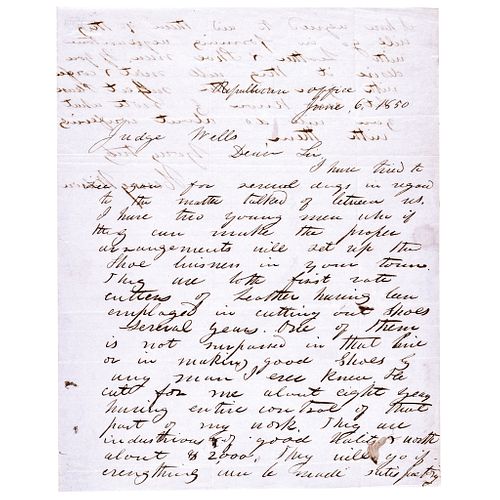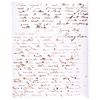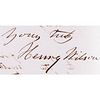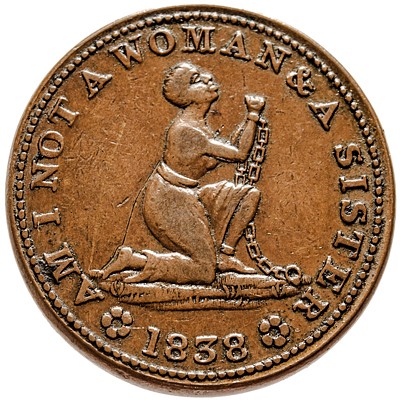HENRY WILSON Autograph Letter Signed 18th U.S. V.P. Under President U. S. Grant
Lot 230
Categories
Estimate:
$600 - $800
Absentee vs Live bid
Two ways to bid:
- Leave a max absentee bid and the platform will bid on your behalf up to your maximum bid during the live auction.
- Bid live during the auction and your bids will be submitted real-time to the auctioneer.
Bid Increments
| Price | Bid Increment |
|---|---|
| $0 | $10 |
| $200 | $20 |
| $300 | $25 |
| $500 | $50 |
| $1,000 | $100 |
| $2,000 | $200 |
| $3,000 | $250 |
| $5,000 | $500 |
| $10,000 | $1,000 |
| $20,000 | $2,000 |
| $30,000 | $2,500 |
| $50,000 | $5,000 |
| $100,000 | $10,000 |
| $200,000 | $20,000 |
| $300,000 | $25,000 |
| $500,000 | $50,000 |
About Auction
By Early American History Auctions
Feb 27, 2021
Set Reminder
2021-02-27 12:00:00
2021-02-27 12:00:00
America/New_York
Bidsquare
Bidsquare : Black History & Slavery, Historic Autographs, Colonial America & Weapons
https://www.bidsquare.com/auctions/early-american-history-auctions/black-history-slavery-historic-autographs-colonial-america-weapons-6434
318 Lots of Rare, Historic Autographs, Americana, Civil War Era, George Washington, Abraham Lincoln, Slavery & Black History, Revolutionary War Era, Colonial America, Federal Period, War of 1812, Colonial Currency, Historic Early American Guns & more... Early American History Auctions auctions@earlyamerican.com
318 Lots of Rare, Historic Autographs, Americana, Civil War Era, George Washington, Abraham Lincoln, Slavery & Black History, Revolutionary War Era, Colonial America, Federal Period, War of 1812, Colonial Currency, Historic Early American Guns & more... Early American History Auctions auctions@earlyamerican.com
- Lot Description
Autographs
"Henry Wilson" Autograph Letter Signed the 18th United States Vice President Under President Ulysses S. Grant
V.P. HENRY WILSON (1812-1875). 18th Vice President of the United States (1873-1875) serving under President Ulysses S. Grant, Senator from Massachusetts as leading Republican, and a strong opponent of Slavery (1855-73), a Founder of the Free Soil Party in 1848, a.k.a. the "Natick Shoemaker".
June 6, 1850-Dated Pre Civil War, Autograph Letter Signed, "Henry Wilson", measuring 7.75" x 10", 2 pages, (Boston), Integral Transmittal Cover, Choice Very Fine. Wilson writes to a Judge Wells, The Honorable John Wells, a Justice of this Mass. court from the 22nd day of September 1866, who died at Salem, November 23rd, 1875. It reads, in full:
"Republican Office - June 6, 1850 --- Judge Wells -- Dear Sir, -- I have tried to see you for several days in regard to the matter talked of between us. I have two young men who if they can make the proper arrangements will set up the shoe business in your town. They are both first rate cutters of leather having been employed in cutting out shoes several years. One of them is not surpassed in that line or in making good shoes by any man I ever knew. He cut for me about eight years having entire control of that part of my work. They are industrious of good habits & worth about $2,000. They will go if everything can be made satisfactory. -- I have agreed to aid them if they will go in forming acquaintances with Leather & Shoe men. If you desire it they will meet & confer with you on the subject. Please let me know & note what you will do about conferring with them. -- Yours truly --- (Signed) Henry Wilson". Docket on the blank reverse reads: "Henry Wilson - June 6, 1850".
After trying and failing to find work in New Hampshire, in 1833 Wilson walked more than one hundred miles to Natick, Massachusetts, seeking employment or a trade. Having met William P. Legro, a shoemaker who was willing to train him, Wilson hired himself out for five months to learn to make leather shoes called "brogans". Wilson learned the trade in a few weeks, bought out his employment contract for $15, and opened his own shop, intending to save enough money to study law.
Wilson had success as a shoemaker, and was able to save several hundred dollars in a relatively short time. This success gave rise to legends about Wilson's skill; according to one story that grew with retelling, he once attempted to make one hundred pairs of shoes without sleeping, and fell asleep with the one hundredth pair in his hand. Wilson's shoe making experience led to the creation of the political nicknames his supporters later used to highlight his working class roots-the "Natick Cobbler" and the "Natick Shoemaker".
Having spent part of his savings on his traveling and schooling, and having lost some as the result of a loan that was not repaid, Henry Wilson worked as a schoolteacher to get out of debt and begin saving money again, intending to start a business of his own. Beginning with an investment of only twelve dollars, Wilson started a shoe manufacturing company. This venture proved successful, and Wilson eventually employed over 100 workers. This original Shoe business related Letter is well handwritten in rich brown on light blue wove period paper, having some minor show-through of ink, faint expected transmittal mailing folds. Boldly Signed "Henry Wilson" at the conclusion, measuring a large 2.5" long.
Henry Wilson (born Jeremiah Jones Colbath; February 16, 1812 - November 22, 1875) was the 18th Vice President of the United States (1873-75) and a senator from Massachusetts (1855-73). Before and during the American Civil War, he was a leading Republican, and a strong opponent of Slavery. He devoted his energies to the destruction of the "Slave Power" - the faction of slave owners and their political allies which Anti-slavery Americans saw as dominating the country.
Originally a Whig, Wilson was a founder of the Free Soil Party in 1848. He served as the party chairman before and during the 1852 Presidential election. He worked diligently to build an Anti-Slavery coalition, which came to include the Free Soil Party, Anti-Slavery Democrats, New York Barnburners, the Liberty Party, Anti-Slavery members of the Native American Party (Know Nothings), and anti-slavery Whigs (called Conscience Whigs). When the Free Soil party dissolved in the mid-1850s, Wilson joined the Republican Party, which he helped found, and which was organized largely in line with the anti-slavery coalition he had nurtured in the 1840s and 1850s.
While a Senator during the American Civil War, Wilson was considered a "Radical Republican", and his experience as a militia general, organizer and commander of a Union Army regiment, and chairman of the Senate military committees enabled him to assist the Abraham Lincoln administration in the organization and oversight of the Union Army and Union Navy. Wilson successfully authored bills that outlawed slavery in Washington, D.C., and incorporated African Americans in the Union Civil War effort in 1862.
After the Civil War, he supported the Radical Republican program for Reconstruction. In 1872, he was elected Vice President as the running mate of Ulysses S. Grant, the incumbent President of the United States, who was running for a second term.
The Grant and Wilson ticket was successful, and Wilson served as Vice President from March 4, 1873, until his death on November 22, 1875. Wilson's effectiveness as Vice President was limited after he suffered a debilitating stroke in May 1873, and his health continued to decline until he was the victim of a fatal stroke while working in the United States Capitol in late 1875.
Throughout his career, Wilson was known for championing causes that were at times unpopular, including the abolition of slavery and workers' rights for both blacks and whites. Massachusetts politician George F. Hoar, who served in the United States House of Representatives while Wilson was a Senator, and later served in the Senate himself, believed Wilson to be the most skilled political organizer in the country. However, Wilson's reputation for personal integrity and principled politics was somewhat damaged late in his Senate career by his involvement in the Crdit Mobilier scandal.
Our Auction Contents:
Black History & Slavery: (Lots 1 - 63)
Abraham Lincoln Related: (Lots 64 - 74)
Historic Autographs: (Lots 75 - 235)
Colonial America: (Lots 236 - 261)
Revolutionary War: (Lots 262 - 304)
George Washington Related: (Lots 305 - 306)
Early American Guns & Weapons: (Lots 307 - 318) - Shipping Info
-
Early American provides in-house worldwide shipping. Please contact us directly if you have questions about your specific shipping requirements.
-
- Buyer's Premium



 EUR
EUR CAD
CAD AUD
AUD GBP
GBP MXN
MXN HKD
HKD CNY
CNY MYR
MYR SEK
SEK SGD
SGD CHF
CHF THB
THB














